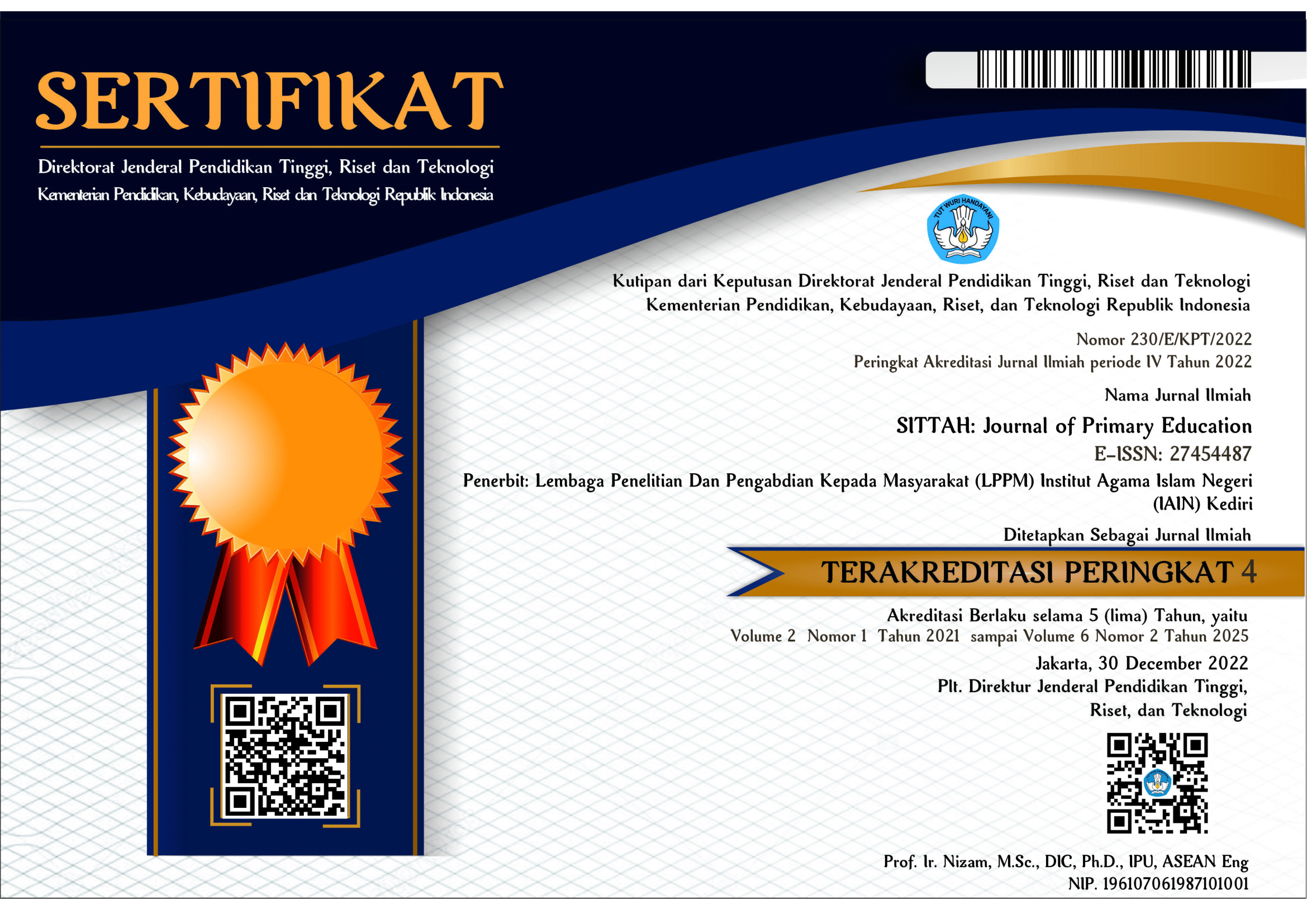PENGARUH MODEL PEMBELAJARAN KOOPERATIF TIPE JIGSAW DALAM MENINGKATKAN MINAT DAN HASIL BELAJAR SEJARAH KEBUDAYAAN ISLAM DI MADRASAH IBTIDAIYAH NEGERI
DOI:
https://doi.org/10.30762/sittah.v3i2.494Keywords:
Cooperative Learning, Jigsaw Type, Learning ModelAbstract
The learning results of Islamic Cultural History (SKI, Sejarah Kebudayaan Islam) for class VI MIN 6 students in Padang City showed unsatisfactory results. The reason is that students are less interested in the subject. Efforts to fix the problem are made by applying jigsaw-type cooperative learning. Through the experimental quasi-research method, this research aims to determine the influence of jigsaw-type cooperative models on student learning outcomes and interests in SKI subjects. The results of this study show that the jigsaw-type cooperative model affects student learning outcomes in SKI subjects. The sig value (2-tailed) post-test using the t-test is 0.000, which means it is smaller than > 0.05. It can be explained by the fact that jigsaw-type cooperative learning makes student learning outcomes positive and significantly correlated. Researchers also used evidentiary testing using the Anova test, which yielded a sig value, in addition to a t-test. (2-tailed) equal to 0.000. By using these criteria, it is proved that 0.000 < 0.05. In addition, it is known that the t-count value is 2.580 with a significant 0.05. The t-table count t value (1.84 0.05) and significant value is smaller because the table t value for df 29 is 2.179. (0.000 > 0.05).
Downloads
References
Afjar, A. M., Musri, & Syukri, M. (2020). Attention, relevance, confidence, satisfaction (ARCS) model on students' motivation and learning outcomes in learning physics. Journal of Physics: Conference Series, 1460(1), 1–6. https://doi.org/10.1088/1742-6596/1460/1/012119
Ariadi, A., Iman, N., Saputro, A. D., & Laksana, S. D. (2021). Improving Students' Interest in Learning Through Various Creative Methods at Madrasah Ibtida'iyah ( Islamic Elementary School ) PAS Baitul Qur'an Gontor Ponorogo. Journal of Research in Islamic Education, 3(2), 1–11.
Baloche, L., & Brody, C. M. (2017). Cooperative learning: Exploring challenges, crafting innovations. Journal of Education for Teaching, 43(3), 274–283. https://doi.org/10.1080/02607476.2017.1319513
Dayagbil, F. T., Palompon, D. R., Garcia, L. L., & Olvido, M. M. J. (2021). Teaching and Learning Continuity Amid and Beyond the Pandemic. Frontiers in Education, 6(July), 1–12. https://doi.org/10.3389/feduc.2021.678692
Dzakira, H. (2003). Teacher- Learner Interactions in Distance Education: A Case of Two Malaysian Universities. The Turkish Online Journal of Distance Education, 4(3), 1–17.
Elvina, E., Ritonga, M., & Lahmi, A. (2021). Islamic Parenting and Motivation from Parents and Its Influence on Children's Ability to Read the Quran. Jurnal Tarbiyatuna, 12(2), 121–134. https://doi.org/10.31603/tarbiyatuna.v12i2.4996
Geven, S., Weesie, J., & Van Tubergen, F. (2013). The influence of friends on adolescents' behavior problems at school: The role of ego, alter and dyadic characteristics. Social Networks, 35(4), 583–592. https://doi.org/10.1016/j.socnet.2013.08.002
Gopalan, M., Rosinger, K., & Ahn, J. Bin. (2020). Use of Quasi-Experimental Research Designs in Education Research: Growth, Promise, and Challenges. Review of Research in Education, 44(1), 218–243. https://doi.org/10.3102/0091732X20903302
Halim, Z., Saputra, R., & Halim, S. (2022). Integrasi Nilai-Nilai Keislaman pada Pembelajaran Seni Budaya di MTs Negeri 5 Padang. Tarbawi Khatulistiwa: Jurnal Pendidikan Islam, 8(2), 28–52. http://dx.doi.org/10.29406/tbw.v8i2.4506
Hidayat, H., Rohiat, S., & Bahar, A. (2020). Implementation of Cooperative Learning Model by Greeting and Question Technique to Improve the Learning Outcomes and Activities Students in SMA 1 Bengkulu. International Journal of Chemistry Education Research, 3(2), 66–69. https://doi.org/10.20885/ijcer.vol3.iss2.art3
Ibda, F. (2015). Perkembangan Kognitif: Teori Jean Piaget. Intelektualita, 3(1), 27–38. https://www.jurnal.ar-raniry.ac.id/index.php/intel/article/view/197
Idris, Muh., Bin Tahir, S. Z., Wilya, E., Yusriadi, Y., & Sarabani, L. (2022). Availability and Accessibility of Islamic Religious Education Elementary School Students in Non-Muslim Base Areas, North Minahasa, Indonesia. Education Research International, 2022, 1–11. https://doi.org/10.1155/2022/6014952
Iqbal, Md. H., Siddiqie, S. A., & Mazid, Md. A. (2021). Rethinking theories of lesson plan for effective teaching and learning. Social Sciences & Humanities Open, 4(1), 100172. https://doi.org/10.1016/j.ssaho.2021.100172
Irviana, I. (2020). Understanding the Learning Models Design for Indonesian Teacher. International Journal of Asian Education, 1(2), 95–106. https://doi.org/10.46966/ijae.v1i2.40
Ismail, S. A. A., & Al Allaq, K. (2019). The Nature of Cooperative Learning and Differentiated Instruction Practices in English Classes. SAGE Open, 9(2), 1–17. https://doi.org/10.1177/2158244019856450
Jacobs, G. M., & Chau, M. H. (2021). Two Approaches for Promoting Student Centered Language Learning: Cooperative Learning and Positive Psychology. Beyond Words, 9(1), 1–15. https://doi.org/10.33508/bw.v9i1.3042
Keiler, L. S. (2018). Teachers' roles and identities in student-centered classrooms. International Journal of STEM Education, 5(1), 1–20. https://doi.org/10.1186/s40594-018-0131-6
Lodge, J. M., Kennedy, G., Lockyer, L., Arguel, A., & Pachman, M. (2018). Understanding Difficulties and Resulting Confusion in Learning: An Integrative Review. Frontiers in Education, 3(June), 1–10. https://doi.org/10.3389/feduc.2018.00049
Lombardi, D., Shipley, T. F., Bailey, J. M., Bretones, P. S., Prather, E. E., Ballen, C. J., Knight, J. K., Smith, M. K., Stowe, R. L., Cooper, M. M., Prince, M., Atit, K., Uttal, D. H., LaDue, N. D., McNeal, P. M., Ryker, K., St. John, K., van der Hoeven Kraft, K. J., & Docktor, J. L. (2021). The Curious Construct of Active Learning. Psychological Science in the Public Interest, 22(1), 8–43. https://doi.org/10.1177/1529100620973974
Lorenza, V. (2022). Efforts in improving Arabic and Islamic Learning Motivation at Tbong Khmum Muhammadiyah Education Center. Tanwir Arabiyyah: Arabic as Foreign Language Journal, 2(1), 51–62. https://doi.org/10.31869/aflj.v2i1.3157
Maison, Tant, T., Kurniawan, D. A., Sukarni, W., Erika, & Hoyi, R. (2021). Assessing Students' Attitudes towards Physics through the Application of Inquiry and Jigsaw Cooperative Learning Models in High Schools. International Journal of Instruction, 14(4), 439–450. https://doi.org/10.29333/iji.2021.14426a
Munawaroh. (2017). The Influence of Teaching Methods and Learning Environment to the Student's Learning Achievement of Craft and Entrepreneurship Subjects at Vocational High School. International Journal of Environmental and Science Education, 12(4), 665–678.
Nugraha, D. Y., Ikram, A., Anhar, F. N., Ningsi Sam, I. S., Putri, I. N., Akbar, M., & Ridfah, A. (2018). The Influence of Cooperative Learning Model Type Think Pair Share in Impriving Self Efficacy of Students Junior High School on Mathematics Subjects. Journal of Physics: Conference Series, 1028(1). https://doi.org/10.1088/1742-6596/1028/1/012142
Peels, R., & Pritchard, D. (2021). Educating for ignorance. Synthese, 198(8), 7949–7963. https://doi.org/10.1007/s11229-020-02544-z
Ritonga, M., Lahmi, A., Saputra, R., Mursal, & Nofrizaldi. (2022). Online Learning During the Covid-19 Pandemic Period: Studies on the Social Presence and Affective and Cognitive Engagement of Students. Pegem Egitim ve Ogretim Dergisi, 12(1), 207–212. https://doi.org/10.47750/pegegog.12.01.21
Ritonga, M., Zulmuqim, Z., Bambang, B., Kurniawan, R., & Pahri, P. (2022). SIAKAD machine learning for correcting errors in speaking Arabic. World Journal on Educational Technology : Current Issues, 14(3), 768–780. https://doi.org/10.18844/wjet.v14i3.72
Seel, N. M. (2012). Experimental and Quasi-Experimental Designs for Research on Learning BT - Encyclopedia of the Sciences of Learning (N. M. Seel, Ed.; pp. 1223–1229). Springer US. https://doi.org/10.1007/978-1-4419-1428-6_716
Shalihin, R. R., & Wendro, H. (2019). The Problems of Islamic Religious Education Teacher for Curriculum Development in Transmigration Area. Nadwa: Jurnal Pendidikan Islam, 13(2), 219–234. https://doi.org/10.21580/nw.2019.13.2.4974
Shields, N. C. (2010). Elementary students' knowledge and interests related to active learning in a summer camp at a zoo. Purdue University.
Thoifah, I., & Biantoro, S. (2021). Problems and Alternative Solutions For the Implementation of Islamic Religious Education Learning During The Pandemic: A Literature Review. PROGRESIVA: Jurnal Pemikiran Dan Pendidikan Islam, 10(1), 1–11. https://doi.org/10.22219/progresiva.v10i1.17693
Walad, M., Razak, A., Lufri, & Putri, D. H. (2019). Implementing jigsaw type of cooperative learning model to improve students' cognitive, affective and psychomotor domains in learning natural ccience at grade IX.1 SMP Negeri 7 Sawahlunto. International Journal of Progressive Sciences and Technologies (IJPSAT), 14(2), 329–337.
Yulisna, Lahmi, A., Halim, S., Ritonga, M., Saputra, R., Rasyid, A., & Mursal. (2022). Strategies to Increase Student Interest in Studying Islamic Religious Education during the Covid-19 Period. International Journal of Early Childhood Special Education, 14(1), 479–486. https://doi.org/10.9756/int-jecse/v14i1.221058
Zulfakar, Z. (2020). Competence of Teachers as Professional Educators. International Journal of Multicultural and Multireligious Understanding, 7(8), 508. https://doi.org/10.18415/ijmmu.v7i8.1960
Downloads
Published
How to Cite
Issue
Section
License
Copyright (c) 2022 Raudha Ningsih, Syaflin Halim, Abdul Halim Hanafi, Dasrizal Dahlan

This work is licensed under a Creative Commons Attribution-NonCommercial-ShareAlike 4.0 International License.











